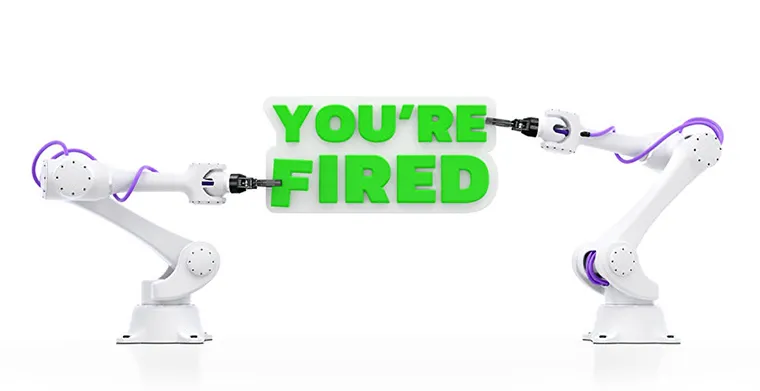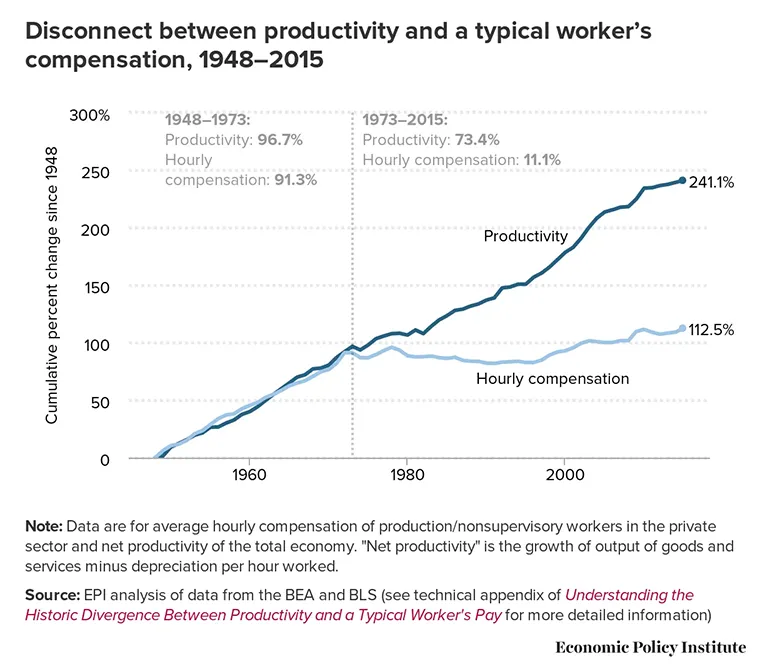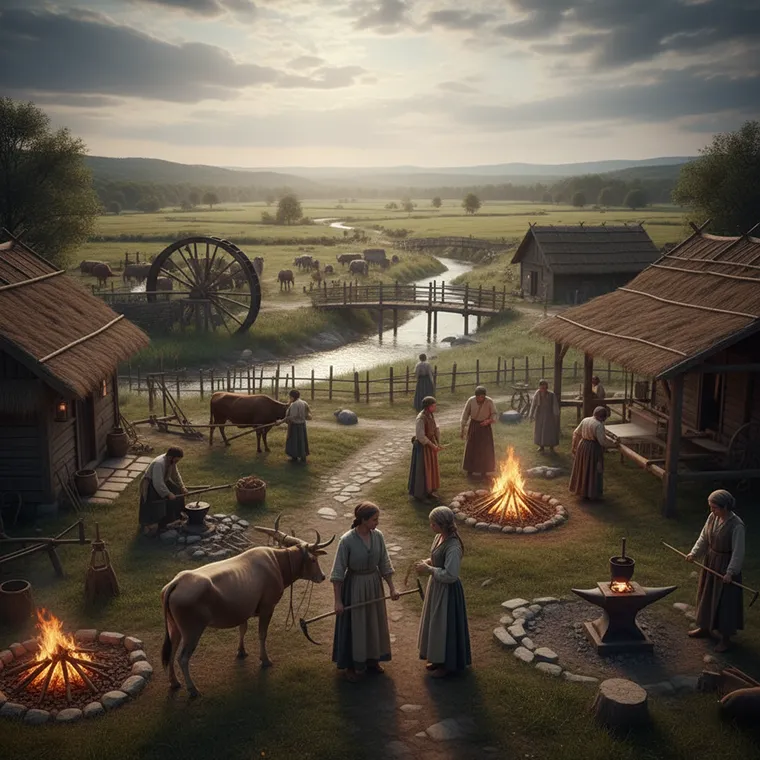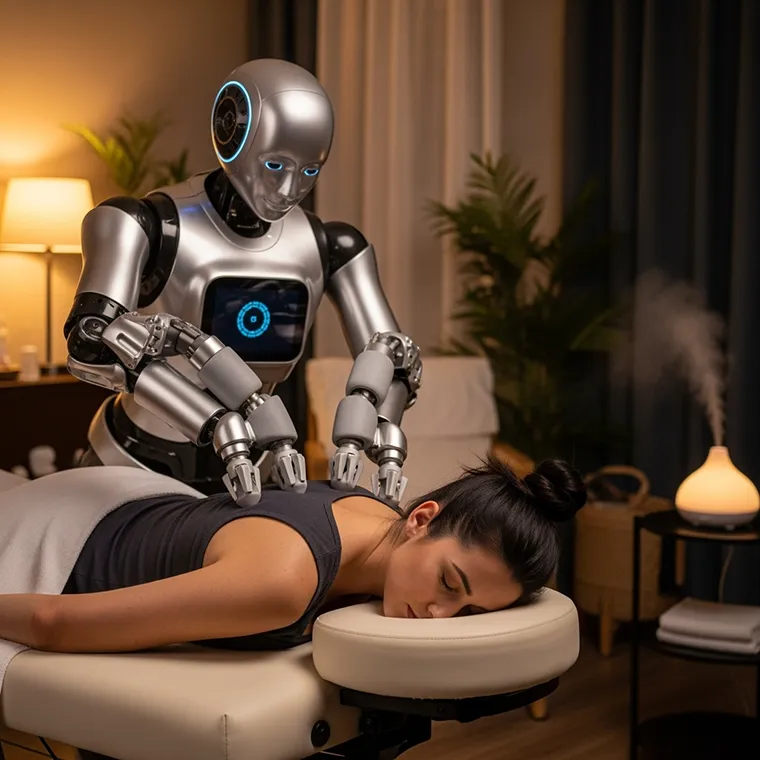On Tech Unemployment and the Labor vs Capital Balance of Power
by Lifeboat Foundation Advisory Board member Nikola Danaylov, M.A.

Capital needs labor to operate, to create a return on investment and, ultimately, to grow. Labor needs capital for wages. Each needs the other and none can do it alone. So labor needs capital as much as capital needs labor. And, while the labor vs capital balance of power has fluctuated closer to one or the other throughout history, classical economics claims that, given their mutual co-dependence, in the long run, we end up (more-or-less) in an equilibrium. This equilibrium is, at least in theory, an ideal win-win scenario where capital is happy that its return on investment is growing and labor is happy that its wages are rising.
The baby boomer generation in North America is among the best examples of the above case. Especially from the late 1940s to the early 1970s, which was the most prosperous period with the fastest growth in the standard of living. But in the 1970s the labor vs capital balance of power shifted in favor of capital and productivity got decoupled from wages. Thus the continued growth in productivity went increasingly to provide more and more returns on investment — i.e. capital, and less-and-less towards wages — i.e. labor.

This was a substantial quantitative change with proportionally substantial quantitative social implications. Today we are approaching a qualitatively different watershed moment which will fundamentally shift the balance of power and have profound social and political implications.
For the first time in history, capital will be able to create, rather than hire, most, and eventually all, of the labor it needs. So the long-standing relationship of mutual co-dependence between capital and labor will be profoundly altered and the equilibrium taught by classical economics will no longer hold. Not even in theory.
Because the incentive for paying wages will be strongly negative, given that technologies such as AI and robotics exhibit a simultaneous rise in productivity and fall in cost. It’s like having workers who produce more and more while getting paid less and less. And, the best thing about it is that one can create and multiply one’s own “labor” force, or cut it when needed, increasingly faster and cheaper. No humans required. And, since the above change is a result of technological changes such as robotics and AI, the resulting unemployment is called technological unemployment.

What if the Luddites were right about technology?
Some say that we have heard similar Luddite arguments before and things worked out for the better. But today’s tech unemployment is not your grandfather’s tech unemployment when we had people pushed out of one kind of manual job and into another. Because capital still needed labor to run machines, oversee production, and manage resources. But today the machines can run on their own. Production can be monitored with sensors. And resource allocation and management can be done by AI. So capital needs less and less labor, until eventually, it may need none at all. Not human labor anyway.
The speed and depth of change we are experiencing currently, combined with an accelerating pace, means we are going to have much, much more happen in much, much less time than during the Industrial Revolution. And we are not simply replacing some manual jobs with others. We are going to make obsolete most human jobs at all industrial levels — from cashiers and production-line workers to accountants, brokers, lawyers, insurance and real-estate agents, consultants, doctors, and even CEOs. That kind of fundamental change, spanning only a couple of decades, will have revolutionary political and social implications. (Similar to how the Industrial Revolution spawned a variety of social movements, armed uprisings, and full-blown political revolutions.)
Historian Yuval Harari has predicted that, just like the Industrial Revolution created the working class, the AI revolution will create “the useless class”. The useless class will consist not merely of people who are not employed — they will be unemployable. And the useless class would be most of us. Furthermore, in the past, capital had incentives to at least preserve labor because the former could not operate without the latter. So you could exploit workers but you couldn’t simply shoot them. At least not all of them. But when you can create your own machine labor then human workers are useless and therefore there are no economic incentives to stop you from doing whatever you want with or to them. That includes shooting them all, especially if workers are organizing politically, sabotaging production, or destroying property. (As unemployed masses of workers historically tend to do.)
It used to be the case that one needed soldiers to do the dirty work of suppressing and, when necessary, shooting. And those soldiers were expensive because they demanded their own share of the pie. So the day soldiers did not get paid was often the day a regime would fall. But, like workers, soldiers are just another example of human labor. And, soon enough, rich dictators and entrepreneurial capitalists will solve that problem too. Because if one can create machine workers, one can also create machine soldiers.

Workers of the future.
There are 5 million truck, taxi, and other drivers plus 3 ½ million cashiers in the United States alone. Those jobs will be gone within 5 years. Eventually, most jobs that exist today will become obsolete. And we are not going to be able to retrain most unemployed people and find them new jobs because to do that we actually need to know what the jobs of the future are. But we don’t. And what makes it even harder is that, even if we did know, by the time we retrain people those new jobs would have already been taken by the robots and AI. (It’s much cheaper and faster to train machines.)
Tech Unemployment is coming and it could be the best or the worst thing. We could become the useless class. Or, for the first time in history, we could become the free class: free from having to work to survive; free to pursue leisure or creative activities of own volition where the reward is not in the paycheck. But the outcome will depend to a great degree on the actions of big capital and a small number of almighty trillion dollar corporations. Will capital fight to preserve the current status quo or embrace the new age? Will it strengthen or break humanity’s chains?

The future may be a paradise — free from having to work to survive.